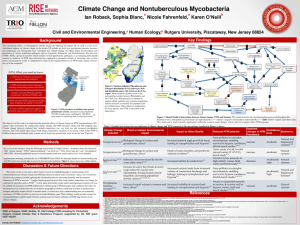Roback, Ian: Climate Change and Nontuberculous Mycobacteria
Title: Climate Change and Nontuberculous Mycobacteria
Name: Ian Roback
Home Institute: St. Olaf College
Programs: RISE program, Graduate School Exploration Fellowship (GSEF) – Big Ten Academic Alliance
Other contributors: Sophia Blanc, Nicole Fahrenfeld, Karen O’Neill
Abstract: “The intensifying effects of anthropogenic climate change are ongoing and impact life on earth at every level. Anticipated impacts of climate change in the eastern US include sea level rise, precipitation intensity increase, and temperature rise. Researchers have considered how climate change will likely impact the prevalence and persistence of various waterborne pathogens such as legionella, salmonella, and nontuberculous mycobacteria (NTM). NTM, a group of microbes which includes several opportunistic pathogens, is an emerging public health concern as instances of NTM lung infections have appeared in geospatial clusters at increasing rates in New Jersey and around the world. However, a comprehensive study on the expected behavior of NTM under climate stressors has yet to be completed.
By synthesizing climate change and NTM literature, along with GIS mapping data, the objective of this work is to understand the potential effects of climate change on NTM concentrations in NJ’s natural water ecosystems. Climate change stressors explored here include sea level rise, increased precipitation intensity, and eutrophication. One effect of sea level rise, for example, is increased instances of saltwater intrusion into freshwater ecosystems. While the research is ongoing, one field study suggests that NTM are found less often in saltwater environments, which suggests with moderate confidence that they may not survive well with increased salinity.The results of this review aim to direct future research by highlighting gaps in understanding of the relationship between climate change and NTM prevalence in natural water ecosystems.
”
Biography: Ian Roback, born in Eau Claire, WI is a rising senior majoring in environmental studies and political science with a concentration in statistics at St. Olaf College. Ian is a Horatio Alger scholar, a Gilman scholar, and an honorable mention for the Udall Fellowship. His independent research at St. Olaf on hybrid wetland systems and surface water pollution culminated in a utility patent for a system to reduce turbidity. While at St. Olaf, he has been involved in many campus leadership roles on environmentalism and sustainability as well as civic engagement.
